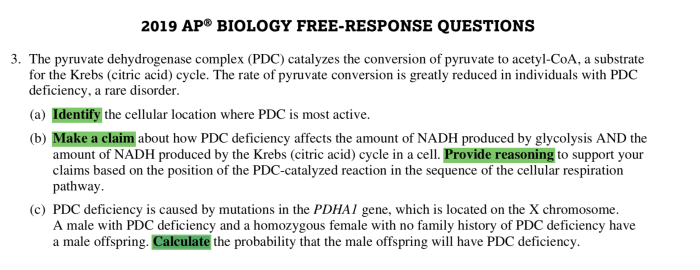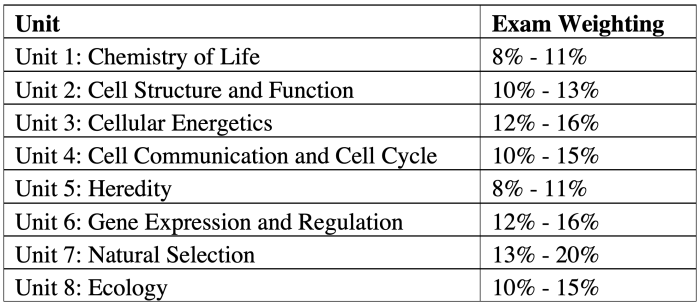Ap biology unit 4 test pdf – Get ready to conquer AP Biology Unit 4 with our comprehensive test prep guide in PDF format! This ultimate resource will equip you with the knowledge and strategies you need to excel in the exam and achieve your academic goals.
In this guide, we’ll delve into the intricacies of Unit 4, covering key concepts, practice problems, and expert tips to help you tackle the exam with confidence. Whether you’re a seasoned AP Biology student or just starting your journey, this PDF is your go-to companion for success.
Introduction
AP Biology Unit 4 encompasses the study of evolution, the diversity of life, and the processes that drive biological change. The Unit 4 test evaluates students’ understanding of these fundamental concepts and their ability to apply them to real-world scenarios.Preparing
thoroughly for the Unit 4 test is crucial for several reasons. Firstly, it allows students to demonstrate their grasp of the subject matter and their readiness for advanced coursework. Secondly, it helps students identify areas where they need further reinforcement, enabling them to focus their studies effectively.
Lastly, it instills confidence and reduces test anxiety, empowering students to perform to their full potential.
Purpose of the Unit 4 Test
The Unit 4 test serves multiple purposes. It assesses students’ understanding of the following:
- Evolutionary theory and its supporting evidence
- The mechanisms of evolution, including natural selection, genetic drift, and gene flow
- The diversity of life on Earth, from prokaryotes to eukaryotes
- The processes that shape the distribution and abundance of species
- The impact of human activities on biodiversity
Importance of Preparing for the Test
Adequate preparation for the Unit 4 test is essential for several reasons:
- It enhances students’ understanding of the core concepts of evolution and biodiversity.
- It enables students to identify areas where they need additional support.
- It boosts students’ confidence and reduces test anxiety.
- It contributes to overall academic success in AP Biology.
Test Structure

The AP Biology Unit 4 test comprises multiple-choice questions and free-response questions, designed to assess students’ understanding of core concepts in molecular biology, genetics, and evolution.
The test consists of two sections:
- Section I: Multiple-Choice Questions (60 minutes)
- Section II: Free-Response Questions (90 minutes)
Section I: Multiple-Choice Questions
This section includes 60 multiple-choice questions, each worth one point. The questions cover a range of topics from molecular biology, genetics, and evolution.
Section II: Free-Response Questions
This section consists of six free-response questions, each worth 10 points. The questions require students to demonstrate their understanding of complex biological concepts and their ability to apply this knowledge to novel situations.
Study Materials: Ap Biology Unit 4 Test Pdf

To excel in AP Biology Unit 4, equipping yourself with the appropriate study materials is crucial. This includes accessing recommended textbooks, study guides, and utilizing online resources for practice and reinforcement.
Textbooks provide comprehensive coverage of the unit’s concepts and principles, while study guides offer focused summaries and practice questions to reinforce your understanding.
Recommended Textbooks
- Campbell Biology, 12th Edition by Jane B. Reece, Lisa A. Urry, Michael L. Cain, Steven A. Wasserman, Peter V.
Minorsky, and Robert B. Jackson
- Biology, 11th Edition by Kenneth A. Mason, Jonathan B. Losos, and Susan R. Singer
Study Guides
- Barron’s AP Biology with CD-ROM, 8th Edition by Deborah T. Goldberg
- Princeton Review AP Biology Prep, 2023 by The Princeton Review
Online Resources
- Khan Academy: Provides video lessons, practice exercises, and full-length practice tests.
- College Board: Offers official practice tests and resources.
- AP Central: Provides access to past exams and scoring guidelines.
Effective Studying Strategies
- Create a dedicated study schedule and stick to it.
- Break down the material into smaller chunks and focus on one topic at a time.
- Use active learning techniques such as flashcards, practice questions, and diagrams.
- Seek help from your teacher or classmates when needed.
- Take regular breaks to refresh your mind and improve retention.
Key Concepts

Unit 4 of AP Biology delves into the fundamental processes that drive the functioning of organisms, from the cellular level to the ecosystem level. Understanding these concepts is crucial for comprehending the intricate tapestry of life on Earth.
The key concepts covered in this unit include:
Cell Communication
Cells communicate with each other through a variety of signaling molecules, including hormones, neurotransmitters, and growth factors. This communication is essential for coordinating cellular activities, regulating development, and maintaining homeostasis.
Example: The release of insulin from the pancreas in response to high blood sugar levels signals cells to take up glucose, thereby lowering blood sugar levels.
Cell Cycle
The cell cycle is the process by which cells grow and divide. It consists of four distinct phases: G1, S, G2, and M. Understanding the cell cycle is crucial for understanding cell growth, development, and reproduction.
Example: The cell cycle is tightly regulated by checkpoints that ensure the accurate duplication and segregation of chromosomes.
Meiosis
Meiosis is a specialized form of cell division that occurs in reproductive cells. It results in the production of gametes (eggs and sperm) with half the number of chromosomes as the parent cell. Meiosis is essential for sexual reproduction and genetic diversity.
Example: Meiosis in humans produces sperm and eggs with 23 chromosomes each, which combine during fertilization to form a zygote with 46 chromosomes.
Mendelian Genetics
Mendelian genetics is the study of inheritance patterns based on the work of Gregor Mendel. It provides the foundation for understanding how traits are passed from parents to offspring.
Example: Mendel’s laws of segregation and independent assortment explain how alleles are inherited independently of each other.
Molecular Genetics
Molecular genetics focuses on the structure and function of genes at the molecular level. It includes the study of DNA, RNA, and protein synthesis.
Example: The discovery of the double helix structure of DNA by Watson and Crick revolutionized our understanding of genetics.
Evolution
Evolution is the process by which populations of organisms change over time. It is driven by natural selection, genetic drift, and gene flow.
You’ll nail the AP Biology Unit 4 test with our comprehensive PDF study guide. After understanding the intricacies of cell communication, take a break and admire the striking patterns of a horse with a mottled coat . Its coat is a testament to the wonders of genetics and variation.
Return to the study guide refreshed and ready to conquer the test!
Example: The evolution of antibiotic resistance in bacteria is a result of natural selection favoring bacteria with genes that confer resistance to antibiotics.
Ecology
Ecology is the study of interactions between organisms and their environment. It encompasses concepts such as population dynamics, community structure, and ecosystem functioning.
Example: The study of predator-prey relationships provides insights into the dynamics of populations and the stability of ecosystems.
Biodiversity
Biodiversity refers to the variety of life on Earth, including the number and variety of species, genes, and ecosystems. It is essential for the functioning of ecosystems and the provision of ecosystem services.
Example: The loss of biodiversity due to habitat destruction and climate change poses significant threats to the health of our planet.
Practice Problems
Practice problems are an essential component of exam preparation. They allow you to test your understanding of the material, identify areas where you need improvement, and develop strategies for solving exam-style questions.
There are several types of practice problems that you can use, including:
Mock Tests
Mock tests are full-length exams that simulate the actual exam in terms of format, duration, and difficulty. Taking mock tests can help you get a feel for the exam and identify areas where you need to focus your studies.
Individual Practice Questions
Individual practice questions can be found in textbooks, online resources, and past papers. These questions can be used to test your understanding of specific concepts or to practice solving particular types of questions.
Common Pitfalls, Ap biology unit 4 test pdf
There are several common pitfalls that students fall into when practicing problems. These include:
- Not practicing enough
- Not reviewing your mistakes
- Relying too heavily on memorization
- Not understanding the concepts behind the problems
To avoid these pitfalls, it is important to:
- Start practicing early and consistently
- Take the time to review your mistakes and learn from them
- Focus on understanding the concepts behind the problems, rather than just memorizing the answers
- Use a variety of practice problems to challenge yourself
Test-Taking Strategies
Test-taking strategies are crucial for success in any exam, including AP Biology. By implementing effective strategies, you can manage your time wisely, approach different question types with confidence, and mitigate stress and anxiety.
To begin, it is essential to familiarize yourself with the test structure and allocate your time accordingly. Determine the number of questions in each section and the time allotted for each. This will help you pace yourself and avoid spending too much time on any one question.
Time Management
- Prioritize questions: Start with the questions you are most confident in to build momentum and save time for more challenging ones.
- Skip and return: If you encounter a question that takes too long to answer, skip it and return to it later if time permits.
- Use process of elimination: If you are unsure of the correct answer, eliminate options that you know are incorrect to narrow down your choices.
Approaching Different Question Types
Different question types require specific strategies:
- Multiple choice:Read the question and answer choices carefully. Eliminate incorrect options and choose the best answer that supports the provided information.
- Free response:Organize your answer in a logical manner, providing specific evidence and explanations to support your claims.
- Data analysis:Examine the data provided and identify patterns, trends, and relationships. Draw valid conclusions based on the evidence.
Handling Stress and Anxiety
Managing stress and anxiety during a test is essential:
- Prepare thoroughly: Study the material well to boost your confidence and reduce anxiety.
- Practice relaxation techniques: Take deep breaths, visualize success, or engage in positive self-talk.
- Stay positive: Maintain a positive attitude and focus on the questions you can answer rather than dwelling on those you may not know.
FAQs
What is the purpose of the AP Biology Unit 4 test?
The AP Biology Unit 4 test assesses your understanding of the concepts covered in Unit 4 of the AP Biology curriculum, including cell communication, cell cycle, and genetics.
How do I prepare for the AP Biology Unit 4 test?
To prepare for the AP Biology Unit 4 test, you should study the course material thoroughly, practice solving problems, and take practice tests to familiarize yourself with the format and content of the exam.
Where can I find practice problems for the AP Biology Unit 4 test?
You can find practice problems for the AP Biology Unit 4 test in this guide, as well as on the College Board website and in various textbooks and study guides.